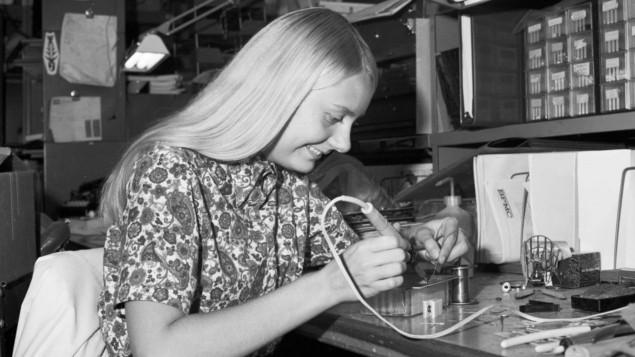Valerie Higgins says that the contributions of support staff should not be forgotten when it comes to celebrating scientific breakthroughs

Modern scientific research, especially physics, is often conducted using complex machines that take years to build, with experiments running for decades. These projects can become full-scale institutions with large organizational structures and thousands of participants. For archivists and others interested in the history of scientific research, developing a complete picture requires an understanding not only of the work that scientists and technical staff do but also the contributions of support staff too.
Fermilab – the US’s major particle-physics laboratory based in Batavia, Illinois – exemplifies “big science”. The scale of the lab’s work has greatly increased over time. For example, when the E288 experiment discovered the bottom quark in 1977, the collaboration included fewer than 20 people. But when Fermilab’s CDF and DZero detectors announced the discovery of the top quark in 1995, each collaboration had about 450 people from institutions all over the world. Today, the lab’s planned Deep Underground Neutrino Experiment already has more than 1100 collaborators from more than 175 institutions.
For the record
In 1978 Fermilab began its archives project to collect, organize, preserve and make available material documenting the lab’s unique and ever-growing history. This involves collecting records that document the contributions of a wide range of laboratory employees and users. In addition to scientific records, the archives also include materials related to activities such as the lab’s arts and lectures series, art gallery, and ecological and educational programmes.
Yet adequately documenting the lab’s scientific programme also requires the archives to look beyond the records of physicists alone to other technical staff and non-technical support staff. Many of them collaborate with scientists at the cutting edge of technology to develop solutions to unique challenges. And while it may be less obvious to document the contributions of non-technical support staff, it is just as essential. Indeed, as organizations become larger and more elaborate, support staff often work between multiple groups and possess unique knowledge about how those organizations operate.
At Fermilab, administrative assistants are a good illustration of how important support staff are. Over the course of their careers, they work with people from many different areas of the lab. This includes scientific groups such as the particle physics division and the accelerator division to the facilities engineering services section that manages the lab’s physical infrastructure, as well as with worldwide collaborators. This gives them a unique perspective on how different parts of the lab work together and what kinds of informal lines of communication exist that might not be reflected in reporting structures. They often also know how organizational structures have changed over time and are familiar with details about how things are done that may not be captured in written procedures.
The lab has recognized the value of their knowledge by sometimes trying to keep the same administrative assistants in areas experiencing leadership changes, so the new leaders can draw on their experience. For the lab’s archivists and others interested in the history of the lab’s operations, these administrative assistants are repositories of unique institutional knowledge that scientific and technical staff may not know. However, this kind of valuable information will often not be found in the records produced by support staff. The best way to capture it is usually through oral interviews, which make their memories and observations part of the archival record.
While human memory can be fallible, these types of interviews are still a valuable complement to more traditional records. The Fermilab Archives’ oral-history programme includes, for example, interviews with not just scientists but also people such as the first lab director’s administrative assistant and selected other support staff. Interviews with non-technical staff have become more common in recent years, many of which have provided fresh insights into the lab’s history. For example, interviews with the lab’s ecologist, security chief and a telecommunications administrative assistant provide perspectives on the day-to-day operations of the lab that are not always visible to scientists but are necessary to keep the lab functioning.
Who knows?
Identifying support staff who possess knowledge that should become part of the archival record can be a challenge. Organizational charts and job descriptions do not always capture everything someone does. In scientific institutions like Fermilab, even people in jobs that seem unrelated to the lab’s scientific work may have specialized knowledge or perform functions specific to the lab that can shed light on how the science was carried out.
For instance, several long-time administrative assistants have described preparing complex scientific manuscripts for publication and the special skills they needed to learn to be able to do this. Others have talked about helping to organize international conferences where the scientists shared their latest research. Often, people with this type of knowledge can only be identified by interviewing others whose key roles are more obvious.
High-energy physics collaborations are often large even by the standards of modern scientific research, which is why oral histories with support staff are essential for fully documenting the work of a lab like Fermilab. In fact, I think other labs and researchers interested in the history of modern scientific research should take our lead. After all, oral histories are essential for creating a complete picture of everything that goes into conducting scientific research and how it is organized.



